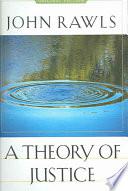“Ideal legislators do not vote their interests.”
Source: A Theory of Justice (1971; 1975; 1999), Chapter V, Section 43, p. 284

A Theory of Justice is a 1971 work of political philosophy and ethics by John Rawls, in which the author addresses the problem of distributive justice . The theory utilises an updated form of Kantian philosophy and a variant form of conventional social contract theory. Rawls's theory of justice is fully a political theory of justice as opposed to other forms of justice discussed in other disciplines and contexts.
“Ideal legislators do not vote their interests.”
Source: A Theory of Justice (1971; 1975; 1999), Chapter V, Section 43, p. 284
“Ideally a just constitution would be a just procedure arranged to insure a just outcome.”
Source: A Theory of Justice (1971; 1975; 1999), Chapter IV, Section 31, pg. 197
Source: A Theory of Justice (1971; 1975; 1999), Chapter I, Section 5, pg. 25
Source: A Theory of Justice (1971; 1975; 1999), Chapter IX, Section 86, p. 577
Source: A Theory of Justice (1971; 1975; 1999), Chapter I, Section 3, pg. 15
Source: A Theory of Justice (1971; 1975; 1999), Chapter III, Section 23, pg. 131
“The fundamental criterion for judging any procedure is the justice of its likely results.”
Source: A Theory of Justice (1971; 1975; 1999), Chapter IV, Section 37, p. 230
“If A were not allowed his better position, B would be even worse off than he is.”
Source: A Theory of Justice (1971; 1975; 1999), Chapter II, Section 17, pg. 103
“To each according to his threat advantage does not count as a principle of justice.”
Source: A Theory of Justice (1971; 1975; 1999), Chapter III, Section 24, pg. 141
Source: A Theory of Justice (1971; 1975; 1999), Chapter IV, Section 40, p. 256
Source: A Theory of Justice (1971; 1975; 1999), Chapter III, Section 29, pg.177
Source: A Theory of Justice (1971; 1975; 1999), Chapter III, Section 26, pg. 151
Source: A Theory of Justice (1971; 1975; 1999), Chapter IX, Section 83, p. 549
“The fault of the utilitarian doctrine is that it mistakes impersonality for impartiality.”
Source: A Theory of Justice (1971; 1975; 1999), Chapter III, Section 30, pg. 190
Source: A Theory of Justice (1971; 1975; 1999), Chapter I, Section 4, p. 21
Source: A Theory of Justice (1971; 1975; 1999), Chapter IV, Section 33, p. 209
Source: A Theory of Justice (1971; 1975; 1999), Chapter IV, Section 36, p. 226
Source: A Theory of Justice (1971; 1975; 1999), p. 216
Source: A Theory of Justice (1971; 1975; 1999), Chapter II, Section 13, pg. 79
“Justice is happiness according to virtue.”
Source: A Theory of Justice (1971; 1975; 1999), Chapter V, Section 48, p. 310